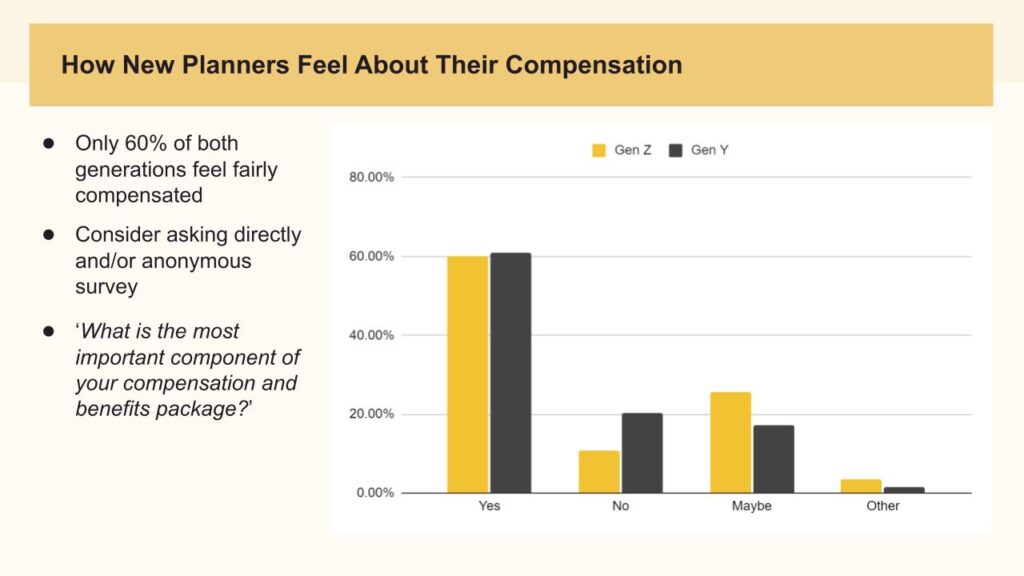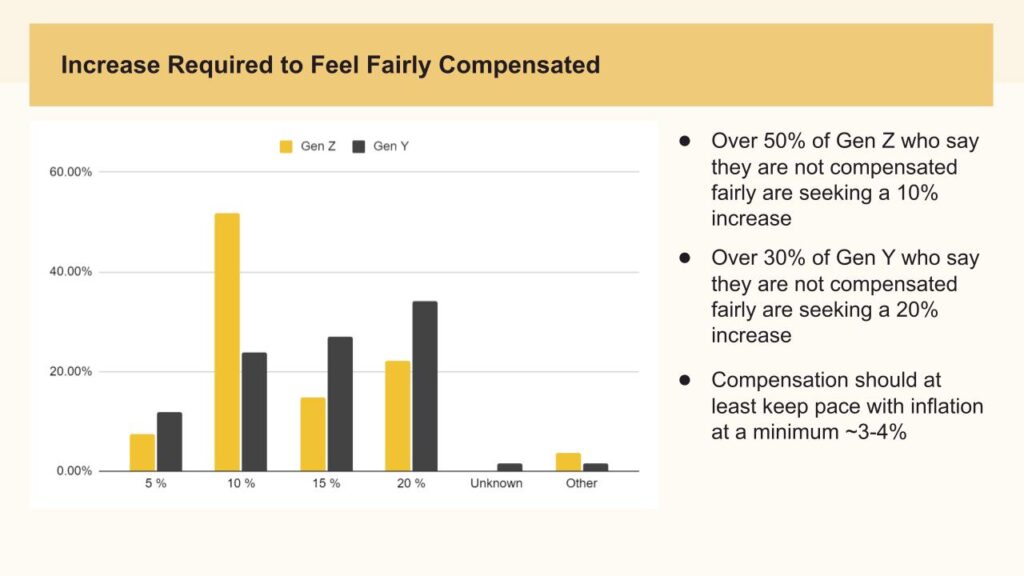Last month in part three of our research survey series, we looked at what activities new planners cited as top priorities when seeking a new firm to join, and what employee benefits were most requested and valued, plus what they specified as the benefit that is most likely to retain them for the long term.
This month we look at how next-generation advisors feel about their compensation, and what type of adjustments would be required to feel fairly compensated (if they’re not already).
How New Planners Feel About Their Compensation
Honestly, it was surprising that only 60% of both Gen Y and Z thought they were fairly compensated. Gen Z was likely more unsure due to their shorter work history. Gen Y on the other hand, having been in the workforce longer and maybe even having a larger peer group data set, was more emphatic in stating they didn't feel fairly compensated.

Notably, though, it is still relatively difficult to get consistent accurate compensation information for the various roles in a financial planning firm’s organizational chart. Other than Schwab and Investment News, who both have a cost to purchase, and the newly released free CFP Salary Calculator, there really isn't much to go on. Which is one of the reasons we started releasing our own Salary Report a few years ago. But ultimately it’s not clear if next generation advisors really aren’t fairly compensated, or if they just feel as though they aren’t because they don’t have clear benchmarks to look to.
In addition, there’s a real risk that the data that is available is not a correct representation, and people are comparing themselves to others incorrectly. See one of our past newsletters about some of the concerns we have with some of the industry salary surveys, where advisors don’t always compare themselves to others with truly analogous job responsibilities. This is why a lot of the clients we recruit for strive to be at least in the top quartile or higher in compensation ranges.
Ultimately, though, in some cases advisors just truly do not feel their compensation matches the value or perceived value they are bringing to the organization. This is why we advocate for the use of employee engagement tools such as Gallup’s Q12 Survey, where you can ask direct questions anonymously, and your employees are much more likely to provide honest and useful answers without fear of retribution. So you can find out how engaged they really are with the firm.
Whatever you do, find a strategy and make sure it is consistent and strive to do what Author Dan Pink suggests ‘to pay your people enough to take the issue of money off of the table.’
Increase Required to Feel Fairly Compensated
Over 50% of the Gen Z respondents who said they did not feel their compensation was fair, said it would take an increase of 10% to feel good about what they are earning. Over 30% of the Gen Y respondents, however, would want to see a bump of 20% to feel satisfied with their compensation!

Generally, employees expect their compensation to increase each year. As soon as their income stops growing, and/or they feel like they are not learning and moving forward in their career, is when they start “looking to see what else is out there.” To keep this from happening, ensure you are evaluating compensation each year so that it at least keeps pace with inflation.
Also, be aware of salary compression(when employees with less tenure, less experience, and sometimes less skills make more) especially if you haven't hired frequently and/or are trying to recruit someone to your firm that you might be more expensive as compared to someone in a similar position currently at your firm. We know of a firm recently that made an uncompetitive offer to a candidate they had been courting for several years because a similar candidate in the firm was being paid less. Instead of adjusting the current team member upward to match their increased contribution to the firm and to more closely reflect the compensation levels of today, they made a somewhat lowball offer to be “fair” to the existing employee… and lost the great recruiting opportunity. Plus they are still going to have to level up their current person’s compensation at some point, anyway, so that they don't also get recruited away by another firm.
Advisor Compensation Takeaways
The takeaways are that compensation is a powerful tool that you can leverage to recruit the best team and accelerate your firm's growth, but it is also a dynamic tool that needs to be constantly evaluated, and there is no one size fits all approach. Furthermore, compensation should not be viewed in a vacuum either. Maybe you aren't able to pay top quartile in terms of cash compensation, but instead have an above-average benefits package, or know you can spend more time mentoring than your peers/talent competitors. There are other factors too such as quality of the opportunity, training, etc., that we have previously covered that go into this as well.
We hope this was helpful. Stay tuned for next month, when we will be diving into equity ownership expectations and timelines.
Feel free to contact us at blog@newplannerrecruiting.com if you have any questions and/or would like to hear more about how we have alleviated many of the headaches over the last 15 years that plague financial planning firms when hiring.


Leave a Reply